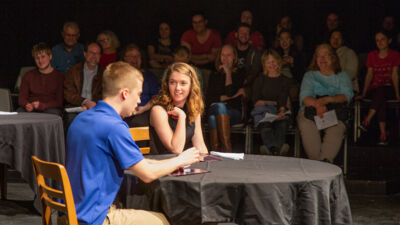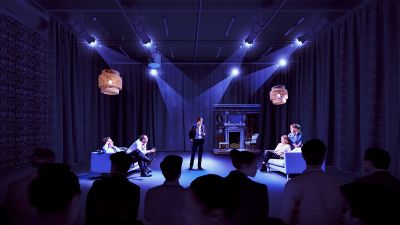Reflecting on memories from the Black Box theater

By Scott Seevers
Senior Director of Development and Engagement
As Mira (Roeder) Wiegmann ’69 recalls the moment from the 1966-67 academic year, she and other drama students were quite pleased when Professor Bill Roundey announced a “new” space on campus dedicated entirely to drama. The area, a humble room in the basement of Concordia’s Music Building, eventually became known as Concordia’s Black Box Studio Theater. Over the next 53 years, the Black Box served the Concordia campus well as the intimate setting for scores of fine arts performances.
In 2021, the physical space disappeared at the hands of a heavy equipment operator, demolished as part of Concordia’s new Music Center project. Yet for those involved in the many performances there, fond memories of the space remain and anticipation for its replacement runs high.
“It was originally designed as an organ repair room,” recalled Wiegmann of the room she first saw as a college sophomore.
However, by the time she returned to her alma mater as a professor and director of theatre in the 80’s, the space was well-established and utilized for other fine arts purposes. Most frequently, the space was used for student-directed one-act plays, entertaining the community and providing an excellent training ground for future drama teachers. Yet the Black Box was more than merely a one-act venue. While the compact space called for simple sets and small casts, “We performed a few musicals in there in the late ’80s, including Little Shop of Horrors and Godspell,” Wiegmann said.
She fondly remembers two smaller shows, “Arcadia” and “Dancing at Lughnasa” among her many favorites. The Black Box, which typically seated an audience of 100, also hosted occasional one-person musical performances. More recently, the IMPROVables, Concordia’s student improvisational group, regularly provided audiences with evenings of lighthearted entertainment and laughs.
The Black Box admittedly had its limitations, especially when it came to set design.
“Every piece of lumber had to be carried down the stairs for sets,” said Wiegmann.
With most audiences viewing from three sides, the small space demanded ingenious set design. Wiegmann remembers one set with two rolling triangles on wheels that had to look like a rope bridge in one scene and palace gates in another. Adam Prince, currently a sophomore theatre and pre-seminary student, noted the prominent cement support pillars that perpetually impacted audience views.
“It will be exciting to have more freedom in the physical space next year,” Prince said.
Professor Bryan Moore, Wiegmann’s successor as director of theatre, acknowledged part of the appeal of the Black Box was finding creative solutions to the space limitations. For one show, he recalls, cell bars were created to simulate an insane asylum and “the audience watched a show behind bars.”
“There were challenges with every show, but we figured out a way to overcome those challenges and still make good art,” Moore said.
Set design challenges aside, the intimacy of the environment was a joy for performers and a wonderful crucible for applying concentration skills while in close quarters with the audience. One former student of Wiegmann’s put it best when comparing the Black Box to Weller Auditorium. “When you’re in Weller, you feel the audience in the same room. When you’re in the Black Box, you feel the audience breathe.”
Primarily, however, the Black Box was beloved because it was a space where the first priority was drama.
“We didn’t have to change out the chapel furnishings for every rehearsal. We could even paint the floor if we wanted—it was our space,” Wiegmann said.
Next fall, a larger, modern space for theatre will open near the location of the original Black Box. Intentionally maintaining a 100-seat capacity, the new theater will feature a modular seating design and the cement posts that previously obstructed views will no longer exist.

“The flexibility of the audience configurations and other activities in the space will be much improved,” Moore said.
Set designers will appreciate extra backstage space and access to an elevator as they build sets, along with modern lighting technology and higher ceilings for improved lighting angles.
“This will be helpful in attracting new students,” Moore said, “including technical students who will enjoy the expanded potential for lighting and sound.”
For the actors, dedicated dressing rooms and costume storage are part of the design, along with a “green room” for actors waiting off stage and curtains that can be configured to provide backstage access for actors, out of the view of the audience.
Prince, the sophomore who will have two years to enjoy the new Black Box before he goes off to seminary, expressed the same sentiment felt by Wiegmann back in the 1960s.
“We’re just really excited to have a place that is our dedicated space—something intentionally designed for us,” he said
Learn more about the Music Center capital project, including the new Black Box Theater